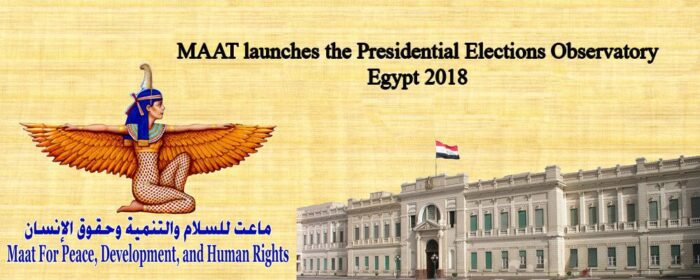Maat inaugurates the presidential election observatory
Egypt 2018
The observatory will issue monthly reports
In mid-July 2017, Maat Foundation for Peace, Development and Human Rights launched the “Presidential Election Observatory - Egypt 2018”, where the work of the observatory will continue until the final report is issued to evaluate the upcoming presidential elections, the first stages of which are scheduled to start in February 2018, and the final results will be announced in early June 2018
The observatory aims to follow up, monitor and analyze all contexts related to the electoral process, and to provide information that helps public opinion and various stakeholders to adopt an objective assessment of the presidential elections and the extent to which their final results reflect society's orientations and the voting process, and judge the extent of their integrity and freedom.
The observatory is a continuation of the activities of the Maat Foundation in following up everything related to electoral entitlements and public referendums after the 30 June 2013 revolution.
In its follow-up to the electoral process, Maat is based on early monitoring and analysis of political, legislative and social developments that may affect, to one degree or another, the integrity of the electoral process, based on internationally recognized standards of integrity and freedom of elections, as well as on the provisions of the Egyptian constitution and relevant regulatory legislation.
The work of the observatory begins in July 2017 by selecting and qualifying the team of researchers, analysts, field and media monitoring officials, and the administrative apparatus, as well as determining the package of reports and statements that the observatory will issue in succession to inform the public opinion and stakeholders of all relevant developments, and it is expected that the package of reports and statements will include informative and analytical materials for the activities of potential candidates Actors, parties, and various political forces, as well as analyzing legislative, institutional and procedural developments and societal reactions, as well as monitoring phenomena that may play a role in the general context in which the electoral process takes place, such as acts of violence and terrorism, and decisions of an economic and social nature, in addition to reports of monitoring and evaluation of the course of the electoral process itself since The formation of the election supervising body (the National Commission), leading to the announcement of final results, through the stages of collecting forms of support, candidacy, appeals, electoral propaganda, voting and counting
Maat Foundation will announce at later times the coordination procedures with local and international organizations that will participate in the follow-up and evaluation of the electoral process, in accordance with the governing legal procedures, and before the start of the field procedures for the electoral process, it will also announce its plans to follow the stages of the electoral campaigning and voting and the geographical scope of the field work for monitoring and the number of followers And the distribution of their roles.
It is worth noting that Maat Foundation for Peace, Development and Human Rights holds a consultative status in the United Nations Economic and Social Council, and since its inception in 2005, it has been interested in following up electoral processes at the local and regional levels through the "Elections and Democracy Support Program", which is one of the Foundation's main programs.
Ayman Aqeel, the attorney and head of the Foundation’s Board of Trustees, stated that Maat’s previous experience revealed the importance of early monitoring and follow-up of the electoral process, as following the official stages of elections represented in candidacy, voting, counting and announcing the results is not sufficient to form an impression and an objective and honest assessment of the electoral process, and draw attention to Maat Foundation for the previous parliamentary elections, for example, lasted a whole year (from the first of January until the end of December 2015).
Aqeel also stressed that the institution is completely open to coordination with all non-governmental parties wishing to follow the electoral process to ensure complementarity, non-conflict and the comprehensive follow-up process for all electoral related aspects, and he also indicated that he hopes that the provisions of the new civil associations and institutions law will be implemented in a flexible manner that does not hinder The role of civil society organizations in following up the elections on a neutral and non-politicized ground, and he added that Maat Foundation will take all necessary legal measures in accordance with the provisions of Law No. 70 of 2017 and its executive regulations after their issuance, and it will also abide by all the organizing rules that will be adopted by the National Elections Commission.
shortlink: https://maatpeace.org/en/?p=22288












